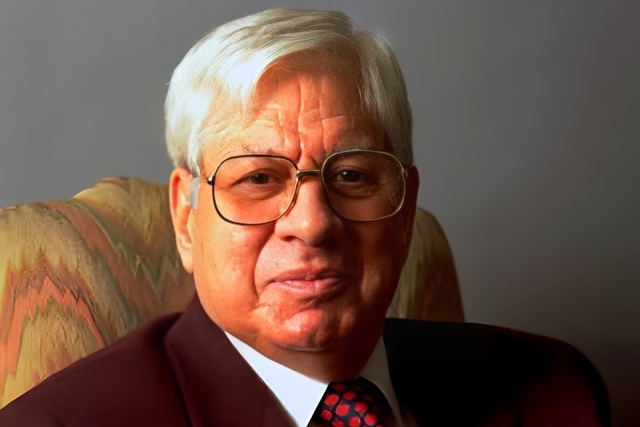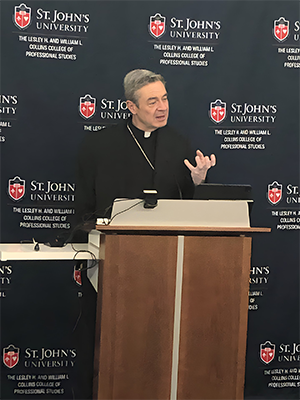
The enduring legacy of a Spanish-born philosopher brought experts in the fields of theology, metaphysics, literature, culture, and theology to The Lesley H. and William L. Collins College of Professional Studies on Friday, March 24.
Fernando Rielo, born in Madrid, Spain, in 1923, established the Idente Missionaries in 1959 and was a force in the development of the Motus Christi (Movement of Christ) initiative that sought to enhance the spirituality of those in missionary life. He lived in the Queens, NY, neighborhoods of Forest Hills and Briarwood before he died in 2004 at age 81.
“He was a resident of Queens in the later part of the 20th century and early 21st century,” said the Most Rev. Robert J. Brennan ’84C, Bishop of the Diocese of Brooklyn, who offered a welcome to those eager to learn more about Mr. Rielo’s life on the 100th anniversary of his birth.

“Who knows, maybe I rode the Q17A or the Q43 bus with him,” Bishop Brennan continued. “The Idente community that he founded brought about a deeper intellectual life, developing leadership and communication skills and engaging the culture through the truth of the gospel.”
Born into the Spanish Civil War, Mr. Rielo was persecuted for his faith, nearly losing his life during the conflict. In 1939, just after the war’s end, a religious experience directed him to “be holy as I your Heavenly Father am holy.” Mr. Rielo began a life of spiritual reflection, culminating in the establishment of the Idente Missionaries, whose name is an amalgamation of Spanish and Latin and means “go forth.”
The order, open to men and women, includes branches for ordained clergy and laity and has houses in 22 countries, including four in the New York metropolitan area. Apart from its missionary work, the order sponsors an annual mystical poetry competition as a tribute to Mr. Rielo, whose own poetry brought readers closer to the divine, experts said.
“With each word sounded by Fernando Rielo, you felt God’s presence,” said Marie-Lise Gazarian, Ph.D., Professor, Department of Languages and Literatures, and Director, M.A. program in Spanish, whose book Fernando Rielo: A Dialogue with Three Voices chronicles Mr. Rielo’s poetry, theology, and philosophy. “He was a man of love, a man of peace, a poet, and a philosopher, but mostly he was a man of God. He inspired us to see the world from the perspective of heaven.”
That message was not lost on the host of students who took in the full-day session in St. Augustine Hall. Junior Emily Battaglia of Brooklyn, NY, who studies Speech-Language Pathology and Audiology at St. John’s College of Liberal Arts and Sciences, discovered a modern-day role model in Mr. Rielo.
“So much of what we learn in philosophy is classical, from Plato and Aristotle,” Emily said. “But Fernando Rielo is a contemporary, modern-age philosopher, and to see a person who lived out his philosophy of life is inspiring.”
In his willingness to see philosophy through a theological lens, Mr. Rielo established a unique place for himself among 20th-century philosophers, according to panelist Rev. Robert Badillo, Ph.D., Adjunct Associate Professor at St. John’s and a member of the Idente community.
Mr. Rielo’s impact has also extended into the sciences. Clinical psychologist Constance Salhany, Ph.D., said Mr. Rielo’s willingness to incorporate spirituality into the study of psychoethics—a branch of psychology that examines the psychological background of a person and the ethical choices he or she makes—has reshaped modern mental health counseling.
“He believed that the spirit is the seat of the human person,” Dr. Salhany said. “Doing psychotherapy in light of Mr. Rielo often involves working through a person’s distorted image of God. That is where I start.”
Related News
Pharm.D. Candidate Earns National CVS Health/AACP Community Pharmacy Award
Last semester, Kharissa Seepersaud, a Pharm.D. candidate in the College of Pharmacy and Health Sciences , and a native of Ghana, was selected as a recipient of the 2025 CVS Health/ AACP Community...
St. John’s Joins National Network to Empower Catholic Leaders
St. John’s College of Liberal Arts and Sciences at St. John’s University is joining a network of 16 Catholic colleges and universities in a grant-funded effort to strengthen listening, dialogue, and...
Q&A with Alicia Calabrese ’94SJC., LEAD Honoree
Alicia Calabrese ’94SJC, Principal of Floral Park Memorial High School, will be among several alumni honored by The School of Education (TSOE) at the 15th Annual Leaders in Education Awards Dinner...
